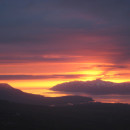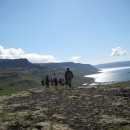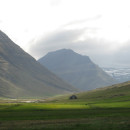Iceland is amazing and the perfect place in which to study renewable energy. Past Review
By Nina W (Carleton College) - abroad from 06/07/2010 to 07/23/2010 with
SIT Study Abroad: Iceland - Renewable Energy, Technology & Resource Economics (Summer 1)
This experience was definitely worth while. I learned a lot about hydroelectric and geothermal systems as well as the type of policy that needs to be considered in order to make renewable energy viable in a country.
Review Photos



Personal Information
| How much international exposure did you have prior to this program? | 1 month - 6 months |
Review Your Program
|
* Overall educational experience
Academic rigor, intensity, resources, etc. |
|
|
* Host Country Program Administration
On-site administration of your program |
|
|
* Housing:
How satisfied were you with your living arrangements? |
The three week home stay in Akureyri was probably my favorite part of the program. It was amazing to meet Icelanders and to really get to know them. |
| * Food: |
|
|
* Social & Cultural Integration:
How integrated did you feel with the local culture? |
|
|
* Health Care:
How well were health issues addressed during the program? |
No particular health issues arose from what I can remember but our directors were very organized and I think would have handled any health issues extremely well. |
| * Safety: |
|
| If you could do it all over again would you choose the same program? |
Yes
|
Finances
|
* Money: How easily were you able to live on a student's budget?
(1 = not very easy/$200+ on food & personal expenses/week, 2.5 = $100/week, 5 = very easily/minimal cost) |
Pretty much everything was covered in our tuition and room and board fees. |
| * Was housing included in your program cost? | Yes |
| * Was food included in your program cost? | Yes |
| Not including program expenses, about how much money did you spend on food and other expenses each week? | $0-$20 (not including souvenirs). |
| Do you have any general money-saving tips for future study abroad participants? | Iceland is expensive but if you are willing to not go out for food or drink too many times and not buy very many souvenirs, you can live pretty cheaply. |
Language
| * Did your program have a foreign language component? | Yes |
|
How much did the program encourage you to use the language?
0 = No encouragement, 5 = frequent encouragement to use the language |
Icelandic is an extremely hard language to learn and because english is spoken by almost all Icelanders, there was really never a time when we had to use Icelandic. But we did take a two week course on Icelandic and it was interesting to learn a little bit about the language and some basic words/ grammar rules. |
| How would you rate your language skills at the beginning of the program? | None |
| How would you rate your language skills at the end of the program? | Beginner |
| What was the highest level language course you had completed prior to departure? | Latin 204 |
| How many hours per day did you use the language? | 0 |
| Do you have any tips/advice on the best ways to practice the language for future study abroad participants? | I would work on pronunciation. You are never going to really learn Icelandic in the short amount of time you are there, especially since everyone speaks english (not to each other but if they realize that you are non-Icelandic, they will immediately start speaking English). However, it is helpful to know how to pronounce the language if you are trying to read off place names etc. |
Other Program Information
|
* Where did you live?
Select all that apply |
|
|
* Who did you live with?
Select all that apply |
|
|
* Who did you take classes with?
Select all that apply |
|
| About how many local friends did you make that you will likely keep in touch with? |
A Look Back
| * What did you like most about the program? |
|
| * What could be improved? |
|
| * What do you know now that you wish you knew before going on this program? | I can't think of anything really. Don't approach it so much as another class but as a way to immerse yourself in a unique culture that includes renewable energy. |








